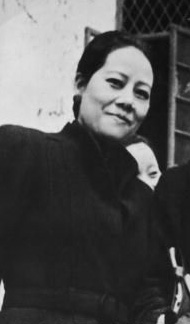Soong Ai-ling
Nancy Soong Ai-ling | |
|---|---|
 | |
| Born | 15 July 1889 Shanghai International Settlement |
| Died | 20 October 1973 (aged 84) New York City, U.S. |
| Spouse | |
| Children | 4, including Kung Ling-i and David Kung Ling-kan |
| Parent(s) | Charlie Soong Ni Kwei-tseng |
Soong Ai-ling (traditional Chinese: 宋藹齡; simplified Chinese: 宋蔼龄; pinyin: Sòng Àilíng), legally Soong E-ling or Eling Soong (July 15, 1889 – October 20, 1973), was a Chinese businesswoman, the eldest of the Soong sisters and the wife of H. H. Kung (Kung Hsiang-Hsi), who was the richest man in the early 20th century Republic of China. The first character of her given name is written as 靄 (same pronunciation) in some texts.[citation needed] Her Christian name was Nancy.
Life
Born in Shanghai,[1] she attended McTyeire School beginning at age 5.[2] Soong Ai-ling arrived in the United States at the Port of San Francisco, California on June 30, 1904, aboard the SS Korea at the age of 14. She attended Wesleyan College in Macon, Georgia.[3]: 47 Soong returned to China in 1909 after her graduation. In late 1911, she worked as a secretary for Sun Yat-sen, a job later taken by her sister, Soong Ching-ling, who later became Madame Sun Yat-sen.
Soong Ai-ling met her future husband, Kung Hsiang Hsi, in 1913, and they married the following year in Yokohama. After marrying, Soong taught English for a while and engaged in child welfare work.
In 1936, she founded the Sandai Company (also called Sanbu Company) and became a successful and immensely rich businesswoman in her own right.[4] During the Second Sino-Japanese War, she was active in the Committee of the National Friends of the Wounded Soldiers and the National Refugee Children's Association, and chair of the local Hong Kong section of the Committee of the National Friends of the Wounded Soldiers.[4]
The three Soong sisters made public appearances in Hong Kong in favor of relief work until 1940, when the Japanese radio stated that they would evacuate rather than join the Chinese government in Chongqing to endure the war conditions.[4] In response to this, they left for Chongqing, where they continued to appear to boost public morale touring hospitals, air-raid shelter systems and bomb sites during the war. They founded the Indusco (also called Gungho) organization to protect Chinese industry during wartime conditions, an organization in which Soong Ai-ling was most active of the sisters.[4]
During the later years of the war, Soong Ai-ling, her husband, and her children were accused of graft, corruption, black-marketing and war profiteering.[4] In 1944, her husband was finally asked to step down as minister of finance.[4] She and her husband transferred their immense wealth and business abroad and left for the US.[4]
She died at age 84 on October 20, 1973 at New York-Presbyterian Hospital in New York City. She is interred in a mausoleum at Ferncliff Cemetery in Westchester County, New York.[5][6]
Children
Source:[7]
- Kung Ling-i (daughter) 孔令儀
- Kung Ling-kan (son) 孔令侃
- Kung Ling-chun,[8] also known as Kung Ling-wei (daughter) 孔令俊
- Kung Ling-chie (son) 孔令傑, also known as Louis C. Kung, was later an American oil executive.[9] He married actress Debra Paget in 1964;[10] they divorced in 1980. The couple had one son, Gregory Teh-chi Kung (born 1964) 孔德基. Louis C. Kung died in 1996 in Houston, Texas.[9]
|
| ||||||||||||||||||||||||||||||||||||||||||||||||||||||||||||||||||||||||||||||||||||||||||||||||||||||||||||||||||||||||||||||||||||||||||||||||||||||||||||||||||||||||||||||||||||||||||||||||||||||||||||||||||||||||||||||||||||||||||||||||||||||||||||||||||||||||||||||||||||||||||||||||||||||||||||||||||||||||||||||||||||||||||||||||||||||||||||||||||||||||||||||||||||||||||||||||||||||||||||||||||||||||||||||||||||||||||||||||||||||||||||||||||||||||||||||||||||||||||||||||||||||||||||||||||||||||||||||||||||||||||||||||||||||||||||||||||||||
| ||||||||||||||||||||||||||||||||||||||||||||||||||||||||||||||||||||||||||||||||||||||||||||||||||||||||||||||||||||||||||||||||||||||||||||||||||||||||||||||||||||||||||||||||||||||||||||||||||||||||||||||||||||||||||||||||||||||||||||||||||||||||||||||||||||||||||||||||||||||||||||||||||||||||||||||||||||||||||||||||||||||||||||||||||||||||||||||||||||||||||||||||||||||||||||||||||||||||||||||||||||||||||||||||||||||||||||||||||||||||||||||||||||||||||||||||||||||||||||||||||||||||||||||||||||||||||||||||||||||||||||||||||||||||||||||||||||||
| Notes:
| ||||||||||||||||||||||||||||||||||||||||||||||||||||||||||||||||||||||||||||||||||||||||||||||||||||||||||||||||||||||||||||||||||||||||||||||||||||||||||||||||||||||||||||||||||||||||||||||||||||||||||||||||||||||||||||||||||||||||||||||||||||||||||||||||||||||||||||||||||||||||||||||||||||||||||||||||||||||||||||||||||||||||||||||||||||||||||||||||||||||||||||||||||||||||||||||||||||||||||||||||||||||||||||||||||||||||||||||||||||||||||||||||||||||||||||||||||||||||||||||||||||||||||||||||||||||||||||||||||||||||||||||||||||||||||||||||||||||
Media portrayal
In the 1997 Hong Kong movie The Soong Sisters, Soong Ai-ling was portrayed by actress Michelle Yeoh.
See also
References
- ^ Gao, James Z. (2009-06-16). Historical Dictionary of Modern China (1800-1949). Scarecrow Press. p. 337. ISBN 978-0-8108-6308-8.
- ^ Pakula, Hannah (2009-11-03). The Last Empress: Madame Chiang Kai-shek and the Birth of Modern China. Simon and Schuster. p. 18. ISBN 9781439154236.
- ^ Coble, Parks M. (2023). The Collapse of Nationalist China: How Chiang Kai-shek Lost China's Civil War. Cambridge New York, NY: Cambridge University Press. ISBN 978-1-009-29761-5.
- ^ a b c d e f g Lily Xiao Hong Lee, A. D. Stefanowska, Sue Wiles: Biographical Dictionary of Chinese Women: v. 2: Twentieth Century
- ^ Hu, Winnie (May 6, 2001). "For Chinese, Bliss Is Eternity in the Suburbs". New York Times.
- ^ "Mrs. H. H. Kung, 85, dies". New York Times. Oct 21, 1973.
- ^ Lily Xiao Hong Lee (2003). 中國婦女傳記詞典: The Twentieth Century, 1912-2000. M.E. Sharpe. pp. 477–. ISBN 978-0-7656-0798-0.
- ^ Frederic E. Wakeman (2003). Spymaster: Dai Li and the Chinese Secret Service. University of California Press. pp. 334–. ISBN 978-0-520-92876-3.
- ^ a b Dawson, Jennifer "Bizarre bomb shelter becoming data center", Houston Business Journal. May 12, 2003; retrieved April 9, 2012.
- ^ Bacon, James (April 21, 1962). "Debra Paget Weds Oilman, Nephew of Madame Chiang". Independent. p. 11. Retrieved June 11, 2015 – via Newspapers.com.

Further reading
- Seagrave, Sterling. The Soong Dynasty. Corgi Books, 1996. ISBN 0-552-14108-9.
External links
 Media related to Soong Ai-ling at Wikimedia Commons
Media related to Soong Ai-ling at Wikimedia Commons
- Articles with short description
- Short description is different from Wikidata
- Pages using infobox person with multiple parents
- Articles with hCards
- Articles containing traditional Chinese-language text
- Articles containing simplified Chinese-language text
- All articles with unsourced statements
- Articles with unsourced statements from June 2022
- Articles needing additional references from April 2015
- All articles needing additional references
- Commons category link is on Wikidata
- 1889 births
- 1973 deaths
- Chinese Methodists
- Educators from Shanghai
- Family of Sun Yat-sen
- Wesleyan College alumni
- 20th-century Chinese businesswomen
- Chinese emigrants to the United States
- Secretaries to Sun Yat-sen
- Burials at Ferncliff Cemetery
